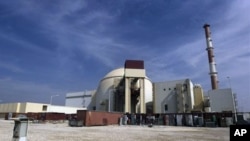Iran remains at odds with the United States and other western powers over its nuclear program and human rights. But despite the tightening of economic sanctions against Iran over the past 12 months, the diplomatic standoff looks set to extend well into next year. Henry Ridgwell reports from London.
Iran has longed claimed that its nuclear program is for peaceful purposes and denies Western accusations that it seeks nuclear weapons.
Iranian negotiators met in early December in Geneva with the representatives of six major powers - the United States, Russia, China, Britain, France and Germany. But Iran agreed only to meet again in Istanbul in January and its chief negotiator, Saeed Jalili, says Iran will not halt its enrichment program.
"We do not believe in talks wherein the other party or parties will use pressure to push their agenda," said Jalili. "We are not going to subscribe to that."
The U.S., the EU and the United Nations Security Council have all ramped up sanctions against Iran in the past year.
In July, President Barack Obama signed into law sanctions targeting Iran's energy and banking sectors, while making it increasingly tough for foreign companies to do business with Iran.
Middle East expert Rosemary Hollis:
"You've seen an increase of pressure on Iran in the form of sanctions and some some surprising developments of unity among the external players to ratchet up the pressure in unison," said Hollis. "But you've also seen Iran seemingly unaffected - certainly in policy terms - even if the economy is hurting quite badly."
Despite the discord, Hollis sees little prospect the dispute will go beyond rancorous diplomacy.
"The signs are that there's been a receding of the possibility of war in part because it would appear that the Iranians are having terrible trouble with their technology," she said. "There's also very strong indications, partly confirmed by the Iranians, that they were hit by some computer viruses that hit the software on which the whole operation depends."
The recent publication of stolen U.S. diplomatic cables included some that say Saudi Arabia's King Abdullah has repeatedly urged the United States to destroy Iran's nuclear program.
Intelligence analyst Bob Ayers says the regional fear over Iran's nuclear program is understandable.
"Having Iran as a regional nuclear power is very destabilizing and the Arab world does not have the capability on its own to take on Iran, so they were trying to push the U.S. into going in and taking action to preclude Iran from developing a nuclear weapon," said Ayers.
Iran's relations with the U.S. are strained further by the continued detention of two Americans, Shane Bauer and Josh Fattal, who are accused of illegally crossing into Iran in 2009. A third U.S. citizen, Sarah Shourd, was released on bail in September. All three claim Iranian border guards arrested them while they were hiking in Iraqi territory.
The case of an Iranian widow and mother of two also has attracted international attention. Sakineh Mohammadi Ashtiani faces death by stoning for alleged adultery, and a murder charge in connection to the death of her husband, but her execution has been repeatedly delayed.
Bahram Soroush has campaigned in Europe for Ashtiani's released.
"If Sakineh is alive today it's thanks to the campaign," said Soroush. "There were many other women and men in similar situations over the last three decades whose names we don't know, who died under sentences of stoning and execution and Sakineh's case was different because we had a picture of her, we had her full name, we had the son and daughter contacting the campaign to say that their mom was going to be stoned."
It's now 18 months since the Iranian government cracked down on the so-called Green Movement protests after the 2009 presidential election. Opposition supporters insist the spirit of those protests is not dead, but for now the Iranian government remains firmly in power.

